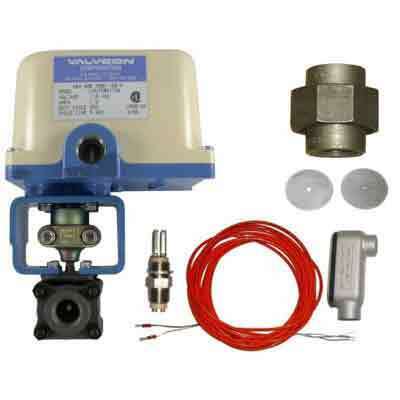SUB CATEGORIES OF Boiler Controllers
It also helps save energy consumption of the device or the system and gets other benefits as well. A boiler controller is like a control box or interface mounted on the boiler unit, which manages the heat generation and distribution process through its control inputs such as plug-and-play, timers, simple programming options, temperature controls, and more. Thus, various types of boiler controllers are being used to control the heat and conductivity of these boilers. It is an essential component in heating systems found in residential, commercial, and industrial applications.
At Cannon Water Technology, Inc., we offer premium quality boiler controllers from different brands such as Pulsafeeder, Walchem, LMI, and so on, which represent the latest in technology advancements.
Working Principle of Boiler Controller System
Here's how boiler controller systems work.
A boiler controller system measures and controls various parameters such as temperature, pressure, dosing, and more in various industrial plants, such as chemical, water treatment, and so on.
These devices have a user-friendly menu along with a screen to view all the readings. Most of these models are specially designed and configured for boiler water control and come with a temperature-compensated conductivity probe, output relays with selectable timers, scalable 4-20mA output to report conductivity, hall-effect, and pulse water meter inputs and digital drum levels, or a flow switch.
Their sensors detect any changes in these process parameters, such as temperature or pressure, and send the signals back to the controller. In case of major fluctuations in any of these readings, the controller alerts the boiler system. They also shut down the system automatically to avoid any damage and injuries.
Key Benefits and Features of Boiler Controllers
Lakewood Instruments Model 150 boiler controller is one of the popular boiler conductivity controllers available from us. The following key benefits of our steam boiler controllers make them an ideal choice for various industrial applications:
- Ensures Maximum Efficiency: The boiler controllers provided by us ensure precise conductivity control. The controllers can be easily controlled using any of these three cycles- Sample/Cycle, Continuous Sample, and Sample/Hold Control. Improved steam system efficiency helps reduce operating costs.
- Easily Programmable: The controllers feature an intuitive menu with a heavy-duty domed numeric keypad made from high-quality stainless steel. There is an illuminated graphical display, which enables easy programming. There are steel domed switches on the keypad that contribute to tactical sensing and improve the life expectancy of the keyboard.
- Application Flexibility: Our controllers offer multiple chemical feeds, which improve application flexibility. They help inhibit corrosion, scale build-up, and precipitation of solids.
- Simple Design: The boiler controllers feature a single circuit board design, which helps improve reliability.
- Indicators: The Model 150 boiler controller is equipped with LED indicators for alarm, power, and relay status. These indicators enable operators to detect failures early, which may otherwise cause serious damage to the equipment.
- NEMA 4 Enclosure: The Lakewood Instruments Model 150 boiler is equipped with a NEMA 4 enclosure, which offers protection against environmental elements, or electrical components from splashing. It also protects users and minimizes the chance of accidents.
Applications of Boiler Controller Systems
There is a wide range of applications of boiler controllers in different industries. Here are some of the application areas.
- Textiles
- Food Processing
- Sugar Plants
- Thermal Power Plants
- Chemical and pharmaceutical Plants
- Water and wastewater treatment
- Paper and Pulp
How to Choose the Right Boiler Controller System?
To select the most appropriate boiler controller, consider the following factors.
1. Understanding the application requirements is key. One needs to weigh these requirements against the features of various boiler controller systems.
2. Specify whether the controller is suitable for the type of boiler you have. Understand whether the boiler is used for commercial buildings, industrial processes, or other applications.
3. Check the level of control required. For simple heating systems, an on/off controller might be sufficient. If your application requires precise temperature or steam pressure control, a modulating or PID controller that can gradually adjust the temperature may be more appropriate. If your system has multiple boilers connected, choose a controller that can effectively manage and balance multiple units at a time.
4. Look for controllers that have energy-saving features like variable load modulation, advanced scheduling, and temperature and pressure controls to improve efficiency and reduce energy consumption. Choose controllers that allow multiple burner stages or variable-speed burners for increased energy efficiency.
5. Choose a controller that can withstand harsh conditions like high humidity or dust, especially if used in industrial environments.
6. Look for controllers that are easy to install and compatible with your boiler system to minimize installation time and cost.
Frequently Asked Questions
- How do I know if my boiler is compatible with a specific controller?
Compatibility depends on the boiler type, fuel type, and system configuration. Check the manufacturer's documentation for specific controller compatibility.
- Can a boiler controller improve energy efficiency significantly?
Yes, modern controllers with advanced algorithms and easily programmable modulating features can optimize combustion and adjust heat output, reducing fuel consumption and improving efficiency.
- What safety features should I look for in a boiler controller?
Essential safety features include overheat protection, low water cut-off, pressure monitoring, and automatic shutoff in case of system failure or fluctuation of any parameters. Look for controllers that can send alerts in real-time to ensure safety.
- How can I determine if I need a new boiler controller?
Consider upgrading if your current controller is outdated, lacks energy-efficient features, cannot be remotely managed, or struggles to maintain consistent temperature control. Advanced features in new controllers could improve efficiency and reliability.

